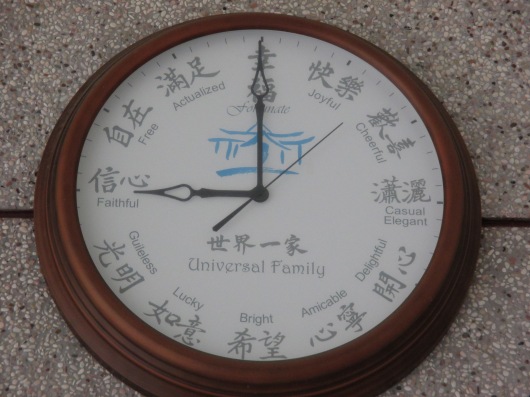Last April I wrote about VOICE (Values Orientation in Classroom Education)
http://raykliu.wordpress.com/2013/04/08/voice/
Our missionary friends use something similar in Taiwan, except that it hasn’t gone mainstream, and is used only as an after-school or Sunday school program. If you want to do direct evangelism, you may face many closed doors as religion-wise Taiwan is predominantly Buddhist/Taoist and steeped in ancestor worship. However, the general population and the education system value virtues, which can become an open door.
Typical values espoused in the school:

Using the values on the face of the clock as an illustration, the Taiwanese value:
1. Fortunate
2. Joyful
3. Cheerful
4. Casual elegant
5. Delightful
6. Amicable
7. Bright
8. Lucky
9. Guileless
10. Faithful
11. Free
12. Actualized
Some values are synonymous with fine shades of differences (e.g. joyful, cheerful, delightful – some deep, some dependent on circumstances), while others show the Taiwanese to believe in fate and are superstitious (e.g. fortunate, lucky).
Teaching Christian values to elementary students:

In contrast, Christian values are inner virtues dependent on God and work even when the going is tough. For example, the fruit of the Spirit (love, joy, peace, patience, kindness, goodness, faithfulness, gentleness, self-control) works under adverse conditions, even if the world is falling apart around the Christian. But it is only available when the person is under the Holy Spirit’s control, and so presents an opportunity to share the gospel when the students wish to have these virtues in their lives.
The gospel never changes, but how it is presented can be adapted to suit the needs of the audience in their context. Don’t box yourself in by sticking to only one tool or one method.
